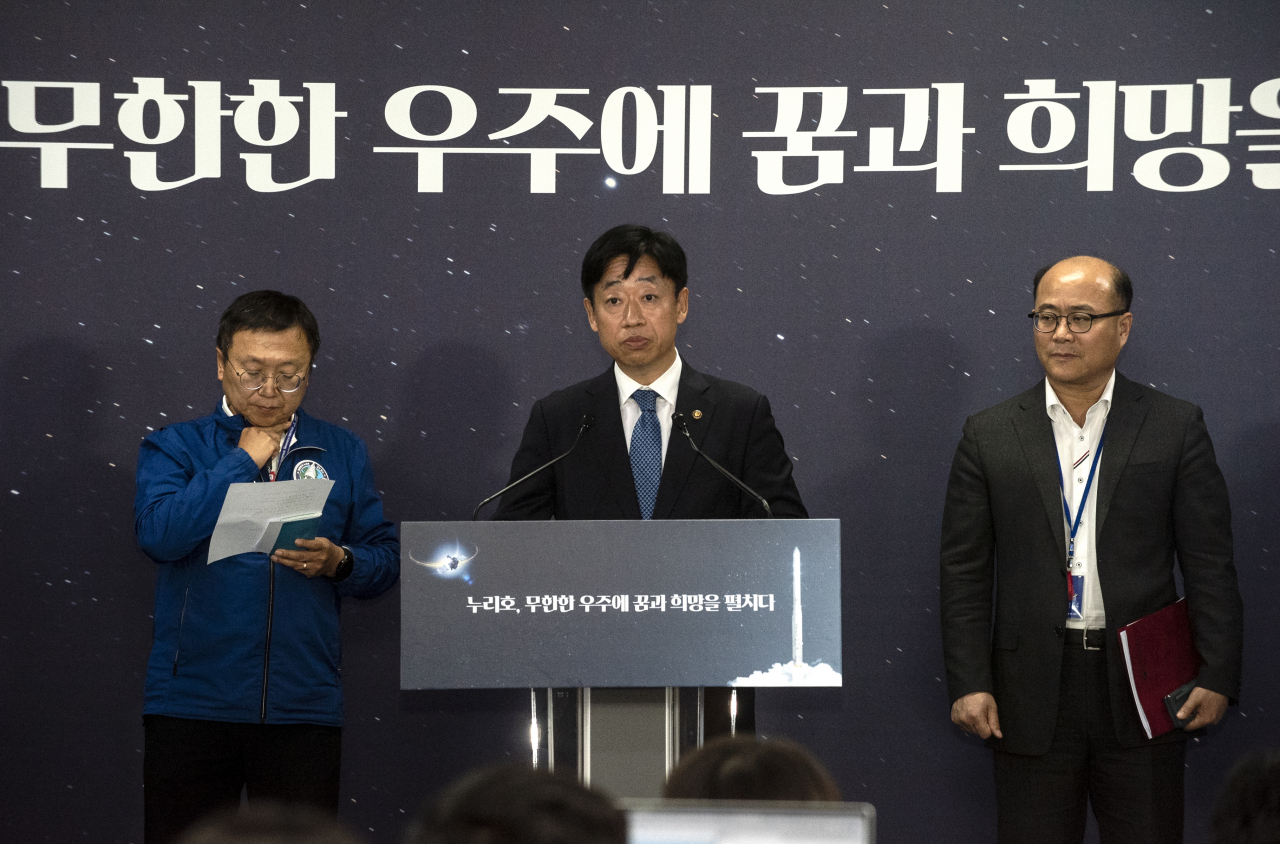Nuri rocket’s 3rd launch postponed
Software problem with ground control found 3 hours before blastoff
By Kan Hyeong-wooPublished : May 24, 2023 - 18:01

GOHEUNG, South Jeolla Province -- South Korea postponed the third launch of the homegrown Nuri rocket due to a software error during the preparation process, the Ministry of Science and ICT said Wednesday.
“During the checkup on the low-temperature helium valve control, a problem occurred in the communication between computers that control the launch operation and the launch pad’s equipment. The valve itself did not have any issues as it could be operated manually. But once the valve control system goes into automatic operation, it could shut down the launch process altogether,” said Oh Tae-seog, first vice minister of science and ICT, in a press briefing.
The decision came after the launch control committee held an emergency meeting at 3:30 p.m. after the problem was found earlier. The Nuri rocket, also known as the Korea Satellite Launch Vehicle-II, was originally scheduled to blast off from the Naro Space Center in Goheung, South Jeolla Province, at 6:24 p.m.
The ministry and Korea Aerospace Research Institute said they will try to find the cause of the problem and come up with a solution through Thursday morning, indicating that a second launch could take place on the next day. However, officials did not provide a timeline for when the final call would be made.
“If the problem can be fixed by tomorrow morning, the launch time is likely to be set for 6:24 p.m. the same planned time as today. The most important thing is that we need to figure out the problem and resolve it first,” said Ko Jeong-hwan, the head of KARI’s KSLV-II project during the briefing.
Ko explained that the problem did not have anything to do with the Nuri rocket’s hardware, saying that the issue was related to the valve of the umbilical cables that were in charge of injecting pressure into the rocket and releasing it.
“We went through numerous rehearsals as we prepared for this launch, but this problem was never found. We always kept in mind that anything could go wrong with so many parts making up the rocket. We have researchers in charge of this area and company officials ready in case of such an incident,” he said.
The official added that the problem-searching and solution-finding process can take place with the Nuri rocket still in the erected position at the launch pad because the issue was found with the ground control’s software.
According to Ko, this was the first time such a problem occurred as the first and second launches of the Nuri rocket were delayed due to different reasons such as bad weather conditions and sensor malfunction in the oxidizer tank.
The ministry said in an earlier briefing that the external launch conditions, such as surface and upper wind speeds, the possibility of lighting and potential collision threats against space objects, met all the standards.
The Nuri rocket’s third launch aimed at placing eight satellites into targeted orbit at an altitude of 550 kilometers. The first and main payload developed by the next-generation small satellite from the Korea Advanced Institute of Science and Technology will observe space radiation.
The state-run Korea Astronomy and Space Science Institute and three private companies -- Lumir, Justek and Kairo Space -- developed the seven cube satellites. The cube satellites’ missions include observing the Earth, testing the waste-reduction technology in space and analyzing the changes of micro-plasma in space.
The first launch of the Nuri rocket fell short of reaching its targeted orbit in October 2021. The second attempt successfully put a dummy satellite into orbit in June 2022 to make South Korea the seventh country in the world with indigenous technology to launch a satellite weighing 1 metric ton or heavier.



















![[Today’s K-pop] Treasure to publish magazine for debut anniversary](http://res.heraldm.com/phpwas/restmb_idxmake.php?idx=642&simg=/content/image/2024/07/26/20240726050551_0.jpg&u=)